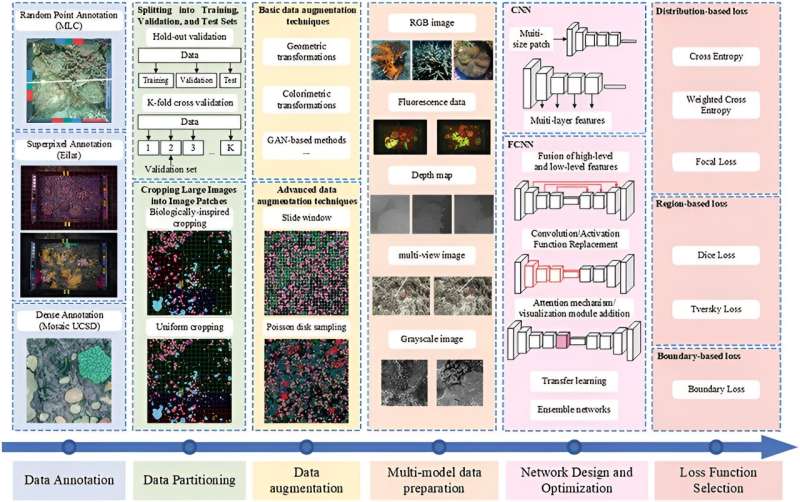This article has been reviewed according to Science X's editorial process and policies. Editors have highlighted the following attributes while ensuring the content's credibility:
fact-checked
proofread
AI goes underwater: Transforming coral reef conservation with cutting-edge image analysis

Coral reefs, nurturing hubs of marine biodiversity, are grappling with mounting threats from environmental shifts. Traditional monitoring techniques, often laborious and invasive, are proving inadequate in the face of rapid ecological changes.
Enter deep learning, a frontier technology that, when coupled with underwater imaging, offers a non-invasive solution poised to transform our approach to coral reef management and understanding.
A recent review published in Geo-spatial Information Science on May 1, 2024, illuminates the profound impact of deep learning on enhancing underwater coral image segmentation.
Spearheaded by a collaborative team from Wuhan University, this study employs cutting-edge AI to markedly elevate the precision and efficiency of coral reef surveillance, arming environmental scientists and conservationists with powerful new analytical tools.
The research pivots on the creation and assessment of a novel, densely annotated dataset, engineered for the semantic segmentation of coral images—a critical task for the precise demarcation of coral from other underwater features.
This dataset facilitated a thorough examination of both established and emergent deep learning models, evaluating their capacity to perform under real-world conditions. The study's meticulous analysis of these models' map-generating capabilities is pivotal for monitoring shifts and assessing the vitality of reef environments.
The team delved into an array of sophisticated machine learning strategies, including convolutional neural networks and semantic segmentation techniques, tailored to surmount the unique challenges of underwater imaging, such as fluctuating light conditions and visual impediments.
Dr. Hanqi Zhang, a co-author of the study, remarks, "Incorporating deep learning into the segmentation of underwater coral images is a game-changer for our capacity to monitor and act on environmental threats to coral reefs. This innovation empowers us with a rapid and precise means to chart and evaluate the well-being of these indispensable ecosystems."
The study's revelations are set to have a significant ripple effect across the fields of marine biology and conservation. With the advent of refined image segmentation methodologies, specialists are now empowered to produce high-resolution coral reef maps with greater accuracy and efficiency.
This leap forward is instrumental in formulating vigilant monitoring and conservation strategies, vital for the endurance of coral reef ecosystems.
More information: Ming Li et al, A survey on underwater coral image segmentation based on deep learning, Geo-spatial Information Science (2024). DOI: 10.1080/10095020.2024.2343323
Provided by TranSpread


















